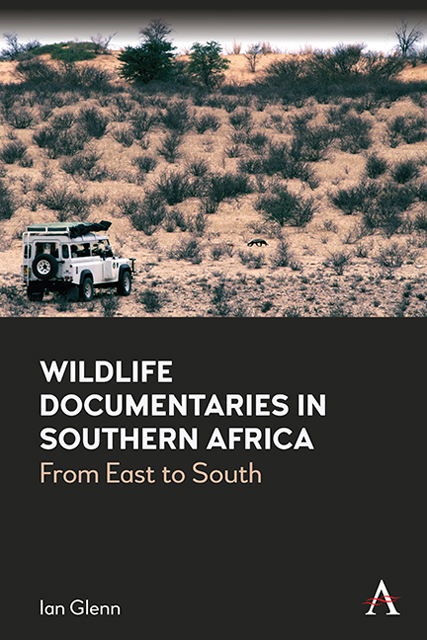Book contents
- Frontmatter
- Dedication
- Contents
- List of Figures
- Acknowledgements
- Introduction
- Chapter 1 What do the Critics Say?
- Chapter 2 A Theoretical Coalition?
- Chapter 3 Gone South: From East to Southern Africa
- Chapter 4 Private Lodges, Infrastructures and Guides
- Chapter 5 Going South: The Results
- Chapter 6 The Early History
- Chapter 7 The South Africans Enter the Game
- Chapter 8 Michael Rosenberg and Partridge Films
- Chapter 9 David and Carol Hughes
- Chapter 10 The Bartletts in the Namib, the Liversedges in Botswana
- Chapter 11 John Varty, Elmon Mhlongo and Londolozi
- Chapter 12 Richard Goss and Kim Wolhuter
- Chapter 13 Dereck and Beverly Joubert
- Chapter 14 Other Major Contributors
- Chapter 15 Going Live: Africam And Wildearth
- Chapter 16 Craig and Damon Foster
- Chapter 17 Must Love Animals?
- Chapter 18 The Social Turn
- Chapter 19 The Future of the Genre
- Chapter 20 The Influence of the Genre
- Conclusion
- Filmography
- Plates
- References
- Index
Chapter 15 - Going Live: Africam And Wildearth
Published online by Cambridge University Press: 10 January 2023
- Frontmatter
- Dedication
- Contents
- List of Figures
- Acknowledgements
- Introduction
- Chapter 1 What do the Critics Say?
- Chapter 2 A Theoretical Coalition?
- Chapter 3 Gone South: From East to Southern Africa
- Chapter 4 Private Lodges, Infrastructures and Guides
- Chapter 5 Going South: The Results
- Chapter 6 The Early History
- Chapter 7 The South Africans Enter the Game
- Chapter 8 Michael Rosenberg and Partridge Films
- Chapter 9 David and Carol Hughes
- Chapter 10 The Bartletts in the Namib, the Liversedges in Botswana
- Chapter 11 John Varty, Elmon Mhlongo and Londolozi
- Chapter 12 Richard Goss and Kim Wolhuter
- Chapter 13 Dereck and Beverly Joubert
- Chapter 14 Other Major Contributors
- Chapter 15 Going Live: Africam And Wildearth
- Chapter 16 Craig and Damon Foster
- Chapter 17 Must Love Animals?
- Chapter 18 The Social Turn
- Chapter 19 The Future of the Genre
- Chapter 20 The Influence of the Genre
- Conclusion
- Filmography
- Plates
- References
- Index
Summary
Introduction
This chapter examines how Southern Africa was the first area to explore new technological capabilities and the possibility of live broadcasting of wildlife in Africam and WildEarth. Africam was the original African live wildlife television sensation, founded in 1998, with a high international viewership and enormous valuations during the early dot.com valuation bubble, valuations which subsequently dropped almost completely. Given the slow Internet speeds in South Africa at the time, it consisted of updates every 30 seconds from static cameras at African waterholes. As Internet speeds have increased, the number of live webcams recording nature has grown exponentially – a recent article pointed to more than 17,000 such sites, many grouped on sites such as Explore.org, EarthCam and Africam.
An interview with Africam CEO Paul Penzhorn in 2019 suggested that the main appeal of the show now is not in grainy images and the hope a wild animal will turn up to a waterhole, but in a quality feed with good sound. Penzhorn said many of their viewers liked to have the programme running on large televisions almost as a peaceful fourth wall or wallpaper and that, particularly during COVID, it offered calm, surprise and authenticity.
The original founder of the programme was Graham Wallington and his ambitions for the programme and the ultimate failure of this business model – a saga recorded in the book The Show Must Go On by Peter Armitage, who acted as CEO of the company for some time – led to him moving on from Africam to found WildEarth (Armitage 2003). When I first visited the WildEarth production team in the Sabi Sand, I was able to interview Wallington, who, to my surprise, mentioned a prediction by Arthur Clarke, science fiction writer, futurist and screenwriter of the 1968 film 2001: A Space Odyssey. Clarke’s prediction and the reality of the Southern African programme make for an illuminating comparison.
Live Time
In 1976, speaking at a celebration of the centenary of the invention of the telephone, Clarke gave several wide-ranging predictions about the future of communication (Clarke 2011).
- Type
- Chapter
- Information
- Wildlife Documentaries in Southern AfricaFrom East to South, pp. 195 - 204Publisher: Anthem PressPrint publication year: 2022



